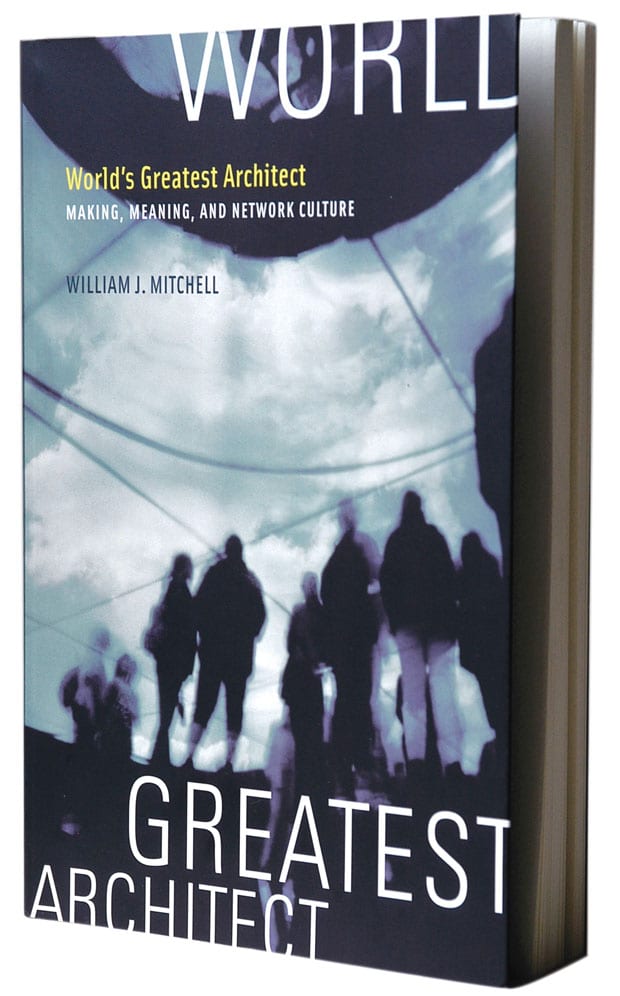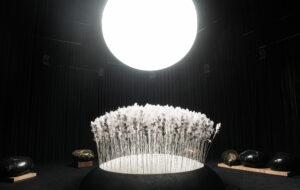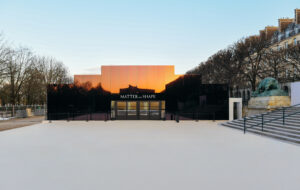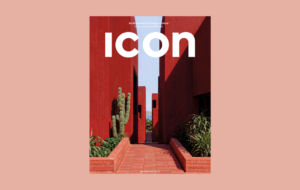
words Daniel Miller
What crisps should you eat while reading Gilles Deleuze? What could God learn from Jane Jacobs? At last, William Mitchell has answered the really important questions, writes Daniel Miller.
The world’s greatest architect is, of course, God. A “multidisciplinary, full-service” practitioner “even older than Philip Johnson”, on the fourth day God created the sun, moon and stars in order to achieve “the Bilbao effect”. Two days later, assisted by one-day-old CAD-monkeys, God “got into blobs” and made man in his computer-generated image. Finally, on the seventh day, God “got a certificate of occupancy” and took a much-needed break from construction, using the time to restructure so as to compete with rival firms SOM and HOK. But all this was some time ago. God’s role at the firm that he founded has long been a largely symbolic one. As William Mitchell puts it: “Lord God (as he had become) still had his name on the door as the senior design partner, but the truth was that he now spent most of his time doing marketing and pontificating on television.”
Mitchell is a professor at MIT, the director of the Smart Cities program there, and the author of numerous scholarly books on the convergence between architecture, computing and urbanism. He is also the proud owner of an independent streak of earthy drollery that remains just about kept in check in his academic writings, yet is fully unleashed here. Written in the downspun, digressive style of a slightly inebriated prairie raconteur, this book assembles 32 of Mitchell’s shorter essays and articles, written over the years for various magazines. Topics include the design crime of bottled water, the complex curvature of potato chips, the proliferation of Wal-Marts, and the museum-like logic of supermarkets. “By collecting from everywhere,” Mitchell points out with respect to both museums and supermarkets, “the citizens of colonial capitals could encapsulate the whole wide world in bounded space and so express their mastery over it.”
“Chip architecture has mostly descended into scale kitsch,” Mitchell writes, lamenting the state of fried snack food. (If you’re British, he’s talking about crisps.) In less competent hands, this sort of knowing pop wryness, of which there is much in this book, would swiftly become unbearable. Yet Mitchell’s lines of attack are often deceptively well-considered, and his humor easygoing and natural. Apparently lacking the uptight self-consciousness that plagues many of his academic colleagues, when he cheerfully recommends the intricately gnarled and warped “Cape Cod chips” as the perfect munching accompaniment to Gilles Deleuze’s similarly intricate text The Fold, he seems completely in earnest, and indeed, why not?
At the heart of this volume is a basically liberal tirade, conducted against the enlightened pretensions of the Utopian master builder in all of his various incarnations and forms. “God’s biggest limitation,” Mitchell writes in his title essay, “was his authoritarian, top-down approach … He’d just dream something up and go, like, ‘Let there be whatever.’ He had never heard of Jane Jacobs, and had no idea that the most complex, diverse, and interesting cities emerge, gradually over many years, from countless incremental interventions and adjustments.”
The clear target here is architectural modernism, and for this reason it is entirely fitting and that in an early essay, Mitchell should salute the work of Robert Venturi and Denise Scott-Brown: “Unlike the new generation of would-be strict fathers,” Mitchell writes, “Venturi and Scott-Brown continue to see ambiguity and inconsistency as valid accommodations to the complexities and contradictions of our era. At a moment of rigidly and manipulatively framed polemical positions, they still insist on the virtues of pragmatism rather than ideology, and naughtiness rather than nuttiness.”
All of this is equally true of Mitchell himself. This is a witty, lucid, and very readable volume, and a superb introduction to his work.
World’s Greatest Architect, William J Mitchell, MIT Press, £10.95
mitpress.mit.edu


















